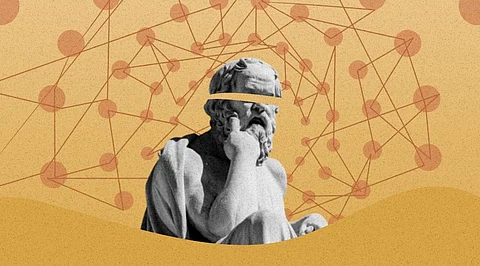
- InsightsInsights
- CryptocurrenciesCryptocurrencies
- Stocks
- White Papers
- IndustryIndustry
- GeographyGeography


We have spent our childhood watching Star Wars where we had witnessed the introduction of the emergence of Artificial Intelligence. Certain robot-centric movies and hi-tech sci-fi movies have created curiosity in our minds to know more about Artificial Intelligence and its impact on human society. Are you confused about which book to read for gaining some perspectives on the Philosophy of the Artificial Intelligence world, which is dominating different fields in human society? Here is our recommendation list of five books that provide an overall perspective on the topic.
In this book, you will learn details on some important philosophical issues in the theoretical framework of Artificial Intelligence. It deals with a specific or cognitive science in general where there is drift with Artificial Intelligence. The argument is whether human consciousness can be artificially created with machine learning algorithms and comprehended in the neural network of robots. The philosophical study consists of human consciousness, behaviour, thinking and perception while on the contrary, artificial intelligence's focus on algorithms to control robots with natural language processing, artificial muscles, cloud computing, biometrics, sensor feelings and so on.
This book is a critique of the mechanistic theory of mind where human philosophy is a much broader concept than the artificial intelligence algorithms. The machine learning mechanism fails to understand the deeper meaning of life in human philosophy. Humans can create wonders in both conscious and subconscious minds but robotic machines can only generate results with a vast flow of real-time data. The author will provide you with two aspects in his book— the epistemological and the metaphysical.
This book gives a clear introduction to connectionism and the core language of hypothesis weaved together from three different fields— philosophy, artificial intelligence and neuroscience. It reviews all types of accomplishments successfully completed in Artificial Intelligence since its emergence in 1956. There is close attention to details on several natures of computer mechanisms, turing machines, and church-turing thesis. He even distinguished between classical symbol processing and parallel distributed processing.
The book analyses the appropriate observation that human minds have full freedom to create creative arts and innovations yet, there is a possibility of computer machines being transformed into human brains. The author has focused on 'intelligence' and 'self-awareness' perceptions in both mechanical and philosophical field for readers to have a clear understanding of the subject.
The human brain is a distinct entity, much different from that of other creatures. It is the quality of the brain, which to a large extent, compensates our lack of physical strength compared to some of the strongest animals and puts us in a position of control. The human brain is highly sophisticated and up until now, there is no match for it. Even the most sophisticated machines and technologies are devised by the human brain and even if at times they seem to surpass it.
The supercomputer may work faster but the programming has been a result of human intelligence. It is the human brain that determines the fate of all other beings, for better or worse, much more than what they can do to themselves. There is already a provocative debate on whether AI is reaching such heights that it would come to determine human intelligence and actions to an overwhelming degree.
But the fact remains that in that case, human beings have to utilize their brain first to impart that kind of capacity/intelligence to invasive technology. So the first decision has to be taken by human beings even if it may cause a severe challenge to them in the sphere of intelligence. The AI can become dominant but only at the behest of the human brain as till now, technology has no consciousness and will of its own. Neil Bostrom's arguments are both fascinating and persuasive. He also analyses the complex and dicey relations between the capacity of the human brain and the potential of AI in such a manner, which keeps the future of AI tantalizingly open.
The author has briefed about the current innovations and happenings in the Artificial Intelligence world including machine learning threats to humanity and a special focus on the interfaces between philosophies, cognitive science, ethical computing. This book covers advanced concepts on Artificial Intelligence such as computation, embodiment and representations of super intelligence, impact of Artificial Intelligence on human society with responsibilities and rights of machine learning algorithms. The readers will gain conceptual knowledge regarding various sectors of Artificial Intelligence including big data analytics, cognitive architecture, robotics as well as expert system.
You can explore the important philosophical issues related to the machine learning aspect of artificial intelligence. This book focuses more on contemporary topics in philosophy with an opportunity to examine all the perspectives of philosophy against the technological mechanism of artificial intelligence.
Select any book by trusting your ability to understand the language and get ready to gain new perspectives on the Philosophy of Artificial Intelligence.
